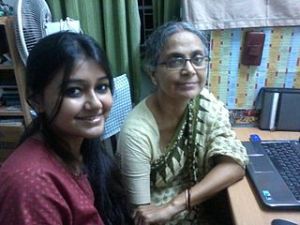It was just a normal afternoon at my uncle’s home in Kolkata in West Bengal, India. My IT professional uncle and aunt were both at work. Their 8-year old son was at school, and my Aunt’s mother welcomed me when I came to visit. She was all by herself in their flat, spending her lazy afternoon with a book and perhaps enjoying a little solitude and a break from regular household work. We sat together, and talked about various topics over a nice warm cup of coffee. We talked about her life, the things she loves and hates, and the dreams she has.

It was then that I discovered she had taken a computer-learning course recently. She received a certificate, too! I was a bit taken aback to hear that, as we don’t meet people everyday who, at the age of 65, have the courage and interest to start with something totally new — and from people who might be much younger than her in age.
I looked at her and the first thing that I felt was how badly I wanted to introduce her to Wikipedia. I didn’t think twice! She didn’t even known what Wikipedia was, but we created an account for her on Bengali Wikipedia. I asked her what name she would like to be known as to the world. When I was about to give her actual name as her username, she uttered this small word: সহজকথা. I looked at her, and she was confident, “My name will be SohojKotha.” Translated into English, it means “Simple Words.”
This was the sweetest thing. She meant that she doesn’t have many things to say, other than some simple words that she wishes to share.
I showed her a little bit of editing and talked about the idea of setting knowledge free. I told her what Wikipedia means to me and to thousands more like me. And she was listening to me like a little child, perhaps wondering how there’s still a whole world to explore, thinking about how the world has changed, and unlike the other things, this one change felt good! She was determined to explore her world all over again, like a student.
The next day, she came to me and we started our second editing session. I realized how great it would be if she started contributing to Wikisource. That way she didn’t have to think of a whole new subject to start with. I had heard her humming Rabindra Sangeet while working and thought she could contribute to Bengali Wikisource by adding a “Rabindrasangeet” there. Thus came her first contribution to a Wikimedia project: she wrote the page আহা আজি এ বসন্তে. I could see the joy in her eyes. The satisfaction of contributing and the pleasure of learning something new!
I remember back in November, I went to Wiki Conference 2011 and talked at “Where are the Women?”, a panel discussion facilitated by Bishakha Datta about the gender gap in Wikipedia. One thing I said there — which I believed then and believe even more now — is that women contribute to society in their own ways everyday, all the time. It is our job to introduce them to this new world that is being created on Wikipedia and its sister projects. By doing this, the world will be better! So let’s work together to make women like my great aunt realize how beautiful they and their knowledge are. Confidence is the thing makes a woman a wonder-woman.
WikiWomen can do wonders, so let’s write Wikipedia.
Sucheta Ghoshal

Can you help us translate this article?
In order for this article to reach as many people as possible we would like your help. Can you translate this article to get the message out?
Start translation